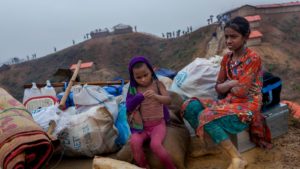View a recording from our recent webinar, “COVID-19’s impact on the survivors we serve”
[maxbutton id=”54″]
All of us at Jewish World Watch want you to know that we are concerned for you, your families and your communities as the COVID-19 (coronavirus) crisis continues. These are clearly extraordinary times for us all.
At the same time, your financial contributions today remain critical, because our work on behalf of those affected by genocide and mass atrocities must continue. We cannot stand idly by, even in days like these.
Indeed, the displaced communities we serve face risks every day and are in a uniquely precarious situation with the worldwide spread of COVID-19. We have reached out to our partners on-the-ground to let you know how they are faring.
Here is what we know about the communities we serve:
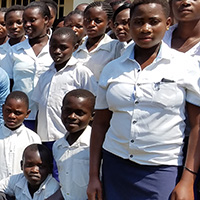 Democratic Republic of the Congo (DRC)
Democratic Republic of the Congo (DRC)
According to our longtime partner in the DRC, there are 3 cases in the western part of the country. When Congo announced its first case, all the details from the health ministry were wrong, raising concerns about the country’s ability to deal with a major health crisis on the heels of an Ebola epidemic. The DRC is already grappling with insufficient health institutions, armed conflict, a profound deficit of trust in public institutions, and a deeply compromised rule of law. Although President Felix Tshisekedi just convened an “extraordinary” meeting of his cabinet to discuss its response to coronavirus, our partners on the ground remain skeptical and concerned about the government’s ability to handle another health crisis. “The coronavirus situation is very frustrating,” shares one Congolese partner. “We are very worried! To be honest, I don’t think the country is prepared to deal with this right after Ebola!”
Syria
Now in its tenth year of war, Syria has seen an escalation in fighting in the last rebel stronghold of Idlib since last December, which has freshly displaced close to 1 million people. Civilian infrastructure, including most hospitals, has been decimated as a tactic of war. Currently, the Syrian government maintains that no coronavirus cases have been logged, yet fears are mounting that an outbreak in this war-beleaguered country would be catastrophic. This would be especially true for Syrians who have fled to overcrowded camps inside Syria’s borders. Our partner in Syria, which aids us in bringing supplies directly into the hands of doctors who remain working in war-torn Idlib, assures us that containers full of medical supplies are continuing to be sent to those doctors. The need for these supplies will be more pressing than ever should an outbreak occur.
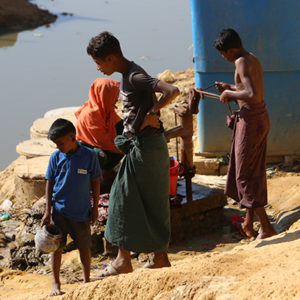 Rohingya in Bangladesh
Rohingya in Bangladesh
While the World Health Organization and JWW’s partners in the Rohingya refugee camps in Cox’s Bazar, Bangladesh report there have been no coronavirus cases yet among the 1 million refugees there, fear of an outbreak is very real. Preparedness efforts are underway, securing clean drinking water, basic hygiene and sanitation. There is also the daunting task of distributing masks and soap to so many vulnerable people. One of our partners on the ground is using the audio-visual learning program JWW funded as a tool to teach the 7,500 Rohingya children in its schools how to protect themselves and their families from infection.
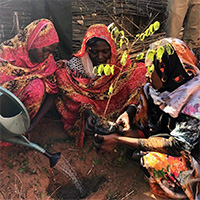 Darfuris in Chad
Darfuris in Chad
So far, the Darfuri camps in Chad have no reported cases of coronavirus. “Operations are going on as normal right now,” reports our partner, even as an additional camp has been set up to deal with a new influx of 16,000 refugees, many of them women and children, as a result of recent clashes in Sudan’s West Darfur State. For Sudan as a whole, dealing with an outbreak would be a test of its fledgling transitional government, which is already facing a slew of challenges.
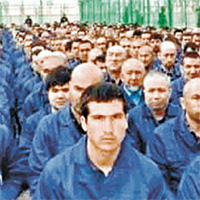 Uyghurs in China
Uyghurs in China
It comes as no surprise that Beijing has been implementing even more draconian approaches to the containment of the Muslim Uyghur population in East Turkestan (also known as Xinjiang) than in the rest of the country. The 2 million or more Uyghurs currently in China’s “re-education camps” — who have been subjected to torture, “re-education” and deprived of their fundamental rights, contact with their families, or any legal recourse — are especially susceptible to contagious disease due to the overcrowded cells, lack of medical resources, and generally horrific conditions.
For Uyghurs remaining outside the camps, forced to live in a surveillance state, the harsh imposition of quarantine without warning has made it nearly impossible for many to procure food, resulting in widespread starvation and panic. Members of the local Uyghur diaspora in Los Angeles, with whom Jewish World Watch regularly partners, are more fearful than ever for their loved ones. “It is heartbreaking not knowing how your family is impacted. We are very concerned about how coronavirus is affecting those back home,” one of them told JWW, asking not to be named to protect relatives in China. Continued advocacy efforts are crucial at this time to make sure that the world does not forget the persecuted Uyghurs.
We thank you for your continued support during this difficult time.
Join us for a FREE WEBINAR, COVID-19’s impact on the survivors we serve, on Thursday, March 26 at 10:00
[maxbutton id=”54″]


